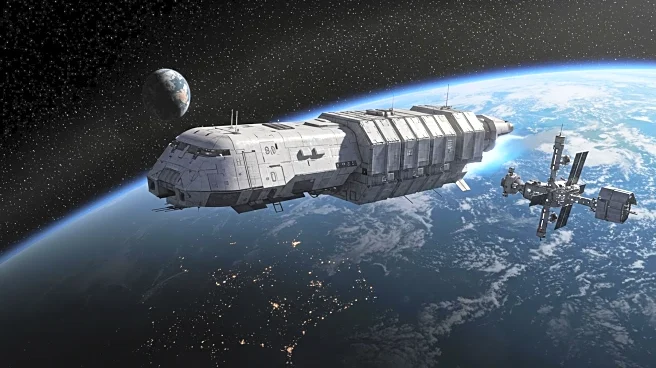What's Happening?
SpaceX has successfully launched a Cargo Dragon spacecraft atop a Falcon 9 rocket, marking the 33rd Commercial Resupply Services mission to the International Space Station (ISS). The spacecraft, carrying over 5,000 pounds of cargo, includes supplies for astronauts and a new propulsion package for orbit raising maneuvers. The Dragon is expected to dock at the Harmony module's forward port on August 25, marking the 50th Dragon vehicle to reach the ISS. This mission supports more than 50 science experiments and technology demonstrations, including 3D metal printing and bone loss studies. The spacecraft will remain docked for nearly five months, performing orbital reboosts to maintain the ISS's altitude.
Why It's Important?
This mission is significant as it marks SpaceX's first long-duration cargo mission, allowing the Dragon to perform multiple orbital reboosts of the ISS. This reduces reliance on Russian Progress vehicles and the station's thrusters, contributing to international efforts to sustain the ISS until its planned demise around 2030. The mission also supports critical research that benefits life on Earth, with over 1,000 science projects conducted in space. SpaceX's involvement in constructing the U.S. Deorbit Vehicle further integrates the company into the ISS operations ecosystem, highlighting its role in future space endeavors.
What's Next?
The Cargo Dragon will remain docked for nearly five months, performing orbital reboosts to maintain the ISS's position. This mission is part of broader efforts by NASA, Roscosmos, and international partners to sustain the ISS until its planned end around 2030. SpaceX is also contracted to construct the U.S. Deorbit Vehicle, scheduled for delivery between 2028 and 2029, to assist with the station's final stages. These developments underscore SpaceX's growing role in space operations and its collaboration with international space agencies.
Beyond the Headlines
The long-duration docking of the Cargo Dragon represents a shift in how the ISS is maintained, potentially setting a precedent for future space station operations. This mission highlights the increasing integration of private companies like SpaceX into international space efforts, reflecting a trend towards commercial involvement in space exploration. The research conducted aboard the ISS continues to advance scientific understanding, with implications for health, technology, and environmental studies on Earth.









